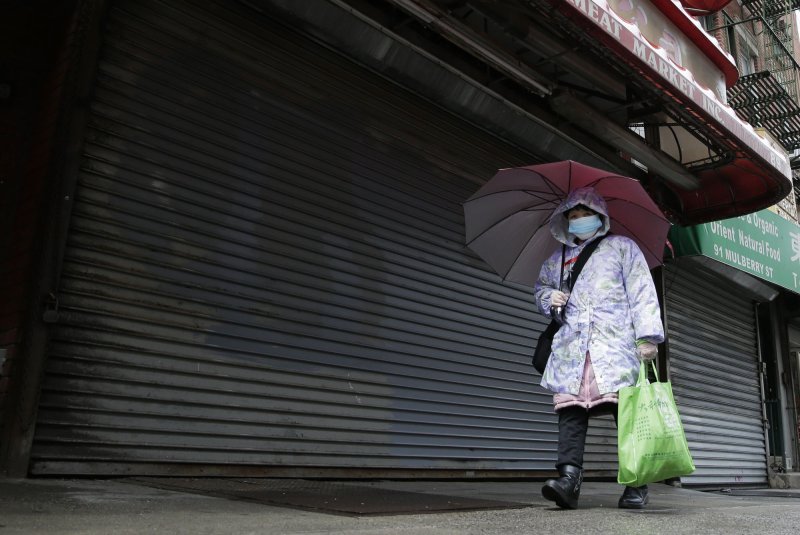A woman passes a series of closed markets and retail stores in the Chinatown section of Manhattan in New York City on April 21. Photo by John Angelillo/UPI |
License Photo
April 27 (UPI) -- New York Gov. Andrew Cuomo said Monday he will extend his "pause" order for non-essential businesses to remain closed beyond May 15 in some parts of the state.
Cuomo said 337 more patients have died, the state's lowest single-day total since the end of March, and hospitalizations and intubations have also declined.
New York officials have reported multiple indicators that the disease has slowed over the last two weeks.
Cuomo said "you could make the cause that we should 'unpause' on May 15" for some of New York's less-affected upstate areas, but added it's "more complicated" in New York City.
"You can't do anything in New York City that you don't do in Suffolk, you don't do in Nassau, you don't do in Westchester," he said. "You can't do anything in downstate that we don't do in coordination primarily with Connecticut and New Jersey."
The number of U.S. cases is about 968,000, according to Johns Hopkins University. The death toll is nearly 55,000, with 107,000 recoveries.
Earlier, New York City Mayor Bill de Blasio announced the roll-out of simpler new "self-swab" coronavirus tests he said will be available at eight hospitals in the city.
Instead of swab tests in which healthcare workers insert a swab deep into a patient's nose to get a sample, the new tests are self-administered, more efficient and safer, de Blasio said.
"This is simpler, this is better," he said. "This is something we're going to start using now, aggressively, because it will improve the situation for everyone."
To make it happen on a wide scale, de Blasio said the city is urging private labs to switch to the new tests.
"We need them to really step up," the mayor said.
Expanded testing will help the city move to the next phase -- a "vast" contact tracing network. De Blasio said New York City plans to hire 1,000 contact tracers immediately.
In New Jersey, with nearly 110,000 cases and 6,000 deaths so far, Gov. Phil Murphy on Monday decided against relaxing near-lockdown conditions ordered five weeks ago and set to expire May 7. He extended his stay-at-home order "until further notice" and announced a reopening plan called "The Road Back: Restoring Economic Health through Public Health."
Murphy said 6,044 have died in New Jersey, an increase of 106, and there are more than 111,000 cases in the state, the United States' second-highest.
Earlier, Murphy said the state will reopen regionally. Northern New Jersey, with its New York City commuters, for instance, may have a different schedule than other sections. It will be based on four factors -- a sustained drop in the hospitalizations curve, expanded testing, contact tracing and enough safe places for people to isolate.
"For us to move out from underneath this order, we will need to see, at the least, a sustained reduction in the number of new positive COVID-19 test results, new COVID-19 related hospitalizations, and other metrics," Murphy said.
Also Monday, the Centers for Disease Control and Prevention updated its list of recognized COVID-19 symptoms.
The CDC added chills, repeated shaking with chills, muscle pain, headache, sore throat and a sudden loss of taste or smell to its existing disease indicators, which included fever, cough and shortness of breath or difficulty breathing.
Mannequins with face masks and designer clothing fill a window at a Diane Von Furstenberg store in New York City on September 8, 2020. Photo by John Angelillo/UPI |
License Photo
















